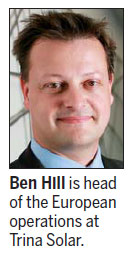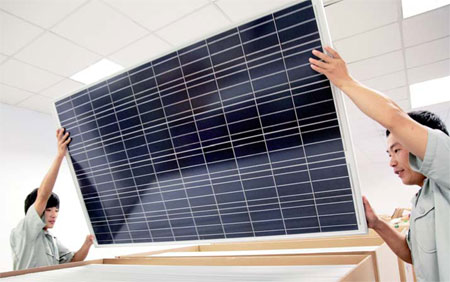Waiting for the sun to shine again
Updated: 2013-01-25 08:53
By Fu Jing and Xie Songxin (China Daily)
|
||||||||
|
Workers load a solar panel at the Trina Solar plant in Changshu, Jiangsu province. Provided to China Daily |

Chinese solar panel makers confident of prospects in Europe, despite EU's anti-dumping investigation
Restricting solar panel exports from China will only lead to higher product costs and derail the development of the clean energy sector if the European Union persists with its anti-dumping stance, experts say.
Chinese solar companies, most of which have Switzerland as their European headquarters, have outlined the solar industry scenario in a written warning sent to EU officials in Brussels, even as the agency decided to go ahead with its investigation.
The EU had followed the US' move and indicated earlier that it would be collecting data and financial information on the European and Chinese operations of the solar panel makers over the next two months as part of its investigation. The commission will announce its results by the middle of this year.
The United States decided in October to impose punitive anti-subsidies and anti-dumping tariffs on imported Chinese solar panels over the next five years, with the highest one at about 250 percent.
"We are closely working with the European Commission and also with our customers to ensure that no biased decisions are taken," says Ben Hill, head of the European operations at Trina Solar. The Changshu, Jiangsu province-based solar company manages its European operations from Wallisellen, Zurich.
According to Hill, it is not correct on the part of the EU to put all Chinese solar companies under one umbrella. "Solar panel prices may go up by as much as 25 percent if Brussels levies anti-dumping penalties," he says.
"We don't believe that such a scenario will actually happen as it would damage the overall market," Hill says, adding that Trina has more than 100 employees in Europe, most of them based in Wallisellen.
Hill says that be it China or Europe, his company does not believe in trade barriers and believes in equal access to each other's markets. "This is the only way to make solar technology sustainable and viable compared to gas, coal, nuclear and other options."
"But if there is a price surge (after the anti-dumping penalty), solar panels will no longer be viable in Germany and other markets," Hill says.
An immediate result of that would be stoppage of work on new solar parks. "If we (investors) don't get any returns, we are not going to invest. Therefore there will be no solar market," Hill says.
Analysts say Brussels' anti-dumping efforts on China's PV sectors may also lead to job losses in the EU and tarnish its reputation of being a global leader in coping with climate change, protecting the environment and promoting clean energy.
Chinese companies are the main suppliers of solar panels in several key European markets such as Germany, Italy, France, Spain, the UK and Greece. While Chinese exporters have localized their businesses in Europe and created jobs in sales and technical support, the lower chain in solar park construction and electricity supply has offered even more jobs to Europeans.
According to industry estimates, for every job created in manufacturing and sales, Chinese companies are also adding two or three jobs in the lower chain. At Trina Solar's European headquarters, only two of its 54 employees are from China.
China's top solar manufacturer Suntech has its European headquarters in Schaffhausen, Switzerland, a 20-minute ride from the Germany-Switzerland border. To cope with Brussels' anti-dumping investigation, Suntech is leading the role of lobbying and also thinking of outsourcing its manufacturing outside China.
"We acknowledge the allegations that were against the Chinese PV industry as a whole," says Pawel Nowotny, Suntech's European marketing director.
Nowotny says his company is one of the sample companies that represent the biggest market player, in this case the Chinese PV industry. "We are working closely with the European Commission and also the Chinese authorities to comply with the investigation routines, and be as transparent as possible.
"We are confident that we would not be found guilty as we don't have anything to hide. We will extend our full support to the probe," he says.
Apart from that, being a global company with multiple sourcing possibilities, Nowotny says: "We are still optimistic that at the end of the day, we will have the means to still do business with European customers.
"At the same time, we are also prepared for the eventuality that we may lose substantial business in Europe if the verdict goes against us."
Suntech believes that Europe will continue to play a leading role in its market operations, but is also looking at other areas such as Israel, South Africa and South America.
Bjorn Emde, media manager for Suntech in Europe, says that Chinese solar companies have played a significant role in adding jobs in Europe.
"The ability of the Chinese companies to create downstream jobs is what we have been highlighting to the EU policymakers," Emde says, adding that most of Suntech's upstream suppliers are key players from the European machinery, raw material and parts sectors.
However, industry insiders like Nowotny believe it is important for the industry to continue with its lobbying. Nowotny is a member of the board of directors at the European Solar Industry Association, while Suntech is the only Chinese company to have ever got such a distinction.
Emde is active in the Alliance for Affordable Solar Energy, an association incorporated in Germany. Emde serves as its vice-president and has been handling policy and media activities.
Emde says Suntech has been the driving force in setting this up with the help of many European partners and has also taken the lead in choosing the lobbyists and media advisers. The Suntech-backed alliance had been set up well before the lawsuit was filed in Brussels, and the rival alliance called "EuProSun" was formed.
However, many Chinese solar companies had earlier indicated that they were not comfortable with the idea of forming an association and collectively addressing the problems with Brussels as they are competing with one another.
This is in sharp contrast to the European companies in China, which despite having different working groups operate under the common umbrella of the European business chamber in Beijing so that they can effectively lobby the Chinese government.
JinkoSolar Holding Co Ltd, a young but rapidly developing Chinese solar company, says the anti-dumping allegations are both unfair and unfounded, and do not reflect the reality of the highly competitive global solar industry. The company believes that trade protectionism will harm fair competition in the market, hinder industry development and prove detrimental for PV consumers.
Dany Qian, global brand director of JinkoSolar, says many European countries, such as Italy, Germany and France, have been ardent supporters of the solar industry. "Even though our relative share in Europe has come down, our volume has increased, and Europe is still the most important and largest market for us at the current stage," says Qian.
Despite the anti-dumping investigation, Qian is confident about the long-term potential of the industry. She says the newly added capacity of PV installations in 2012 was roughly 31 gW, and may double by the end of 2016 with an expected growth of 15-25 percent annually.
"The biggest challenges for the entire industry are oversupply and the global economic downturn, which will probably last for another one or two years," Qian says.
Contact the writers through fujing@chinadaily.com.cn.
Liu Jia contributed to this story.
(China Daily 01/25/2013 page6)

 Li Na on Time cover, makes influential 100 list
Li Na on Time cover, makes influential 100 list
 FBI releases photos of 2 Boston bombings suspects
FBI releases photos of 2 Boston bombings suspects
 World's wackiest hairstyles
World's wackiest hairstyles
 Sandstorms strike Northwest China
Sandstorms strike Northwest China
 Never-seen photos of Madonna on display
Never-seen photos of Madonna on display
 H7N9 outbreak linked to waterfowl migration
H7N9 outbreak linked to waterfowl migration
 Dozens feared dead in Texas plant blast
Dozens feared dead in Texas plant blast
 Venezuelan court rules out manual votes counting
Venezuelan court rules out manual votes counting
Most Viewed
Editor's Picks

|

|

|

|

|

|
Today's Top News
Boston bombing suspect reported cornered on boat
7.0-magnitude quake hits Sichuan
Cross-talk artist helps to spread the word
'Green' awareness levels drop in Beijing
Palace Museum spruces up
First couple on Time's list of most influential
H7N9 flu transmission studied
Trading channels 'need to broaden'
US Weekly

|

|








